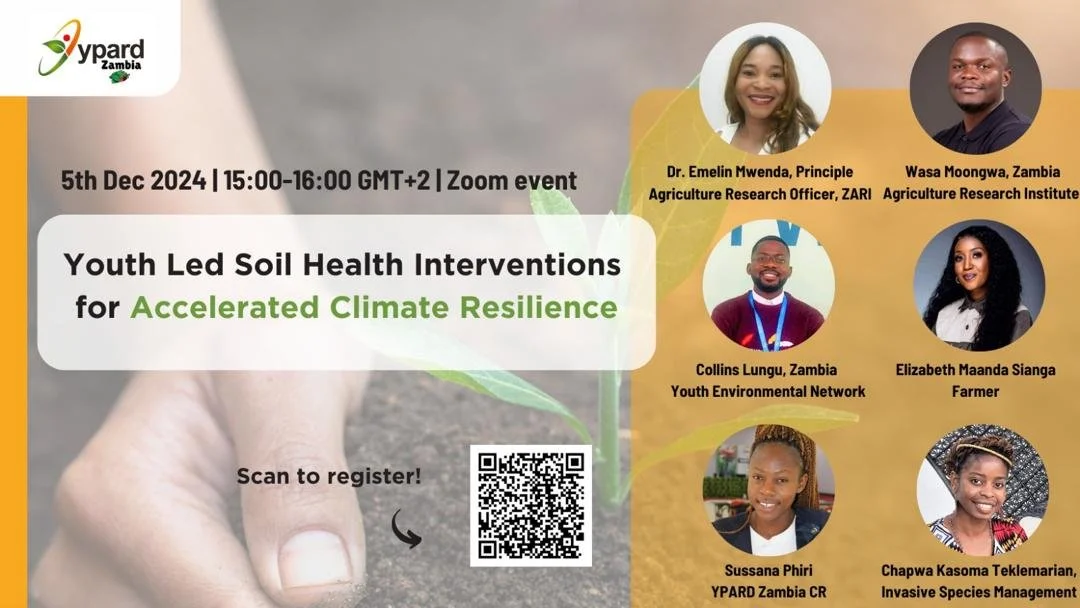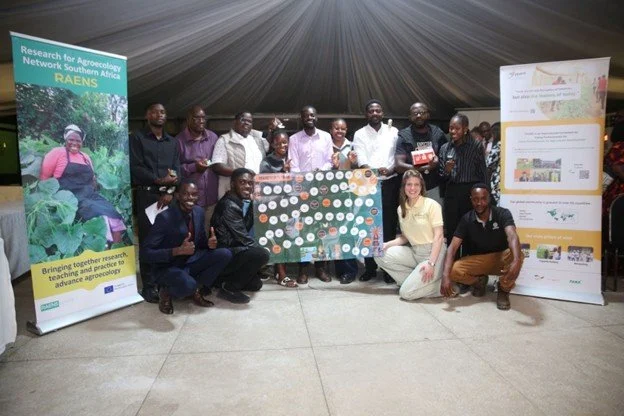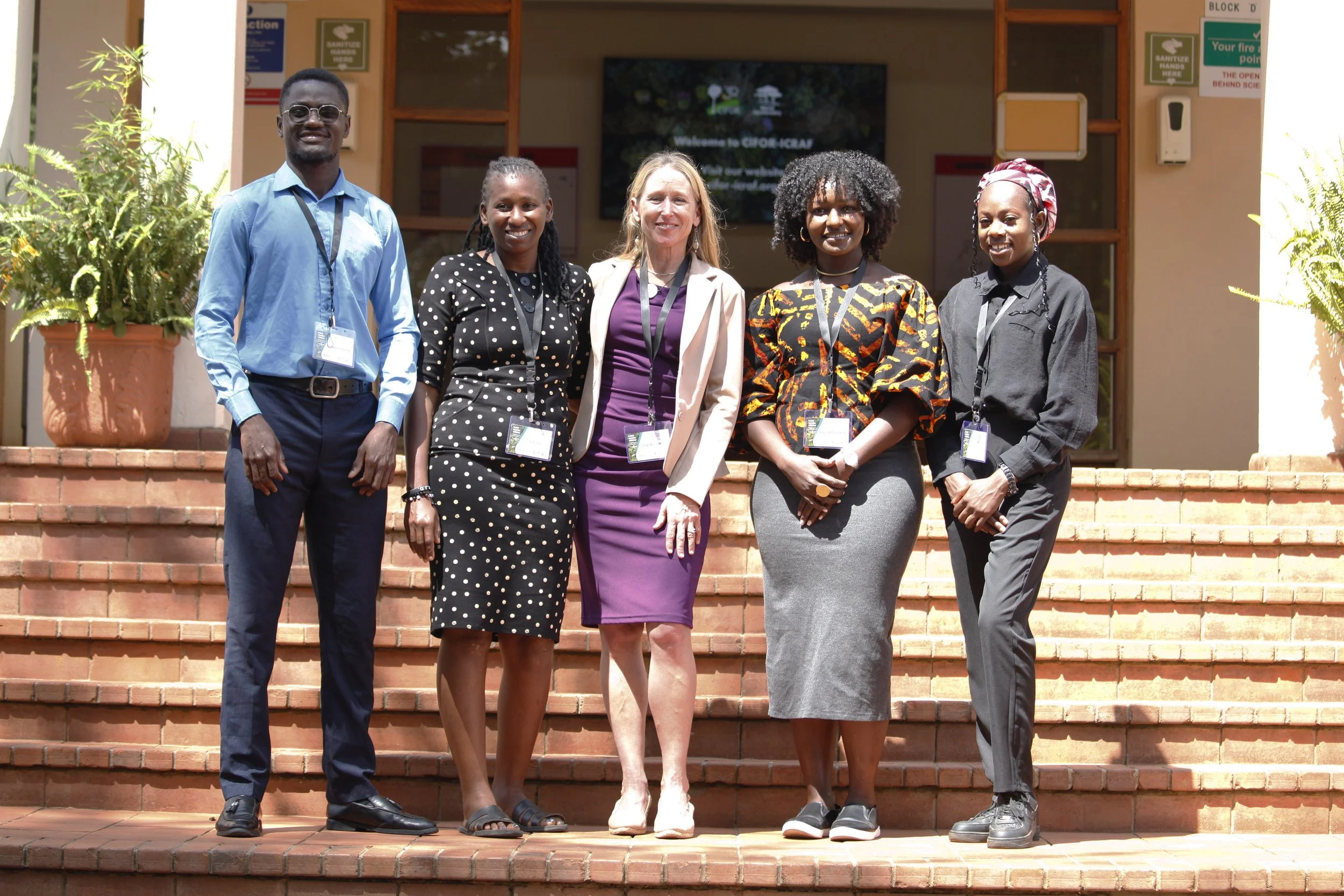YPARD Zambia Hosts YPARD Cafe on World Soil Day
On 5th December 2024, World Soil Day, YPARD Zambia hosted a YPARD Café dubbed "Youth Led Interventions for Soil Health and Climate Resilience". The event, which took place through an online platform, was meant to Convene a diverse group of young leaders to discuss youth-led soil health interventions for climate resilience explore diverse opportunities available for youth to make an impact in the soil health sector and foster youth engagement to elevate soil health interventions for climate resilience in national dialogues.
The speakers in their distinguished capacities emphasized the importance of soil as not only a medium for food production, ecosystem sustainability and biodiversity conservation but also as a medium for youth engagement, economic growth and climate resilience, among many other social benefits.
Young people form a significant amount of Zambia's population. Their vibrance and effort must be promoted in order to achieve soil health and climate resilience. Moderator and YPARD Zambia Country Representative, Sussana Phiri, in setting the tone, reiterated that as young people, who form a significant part of the population, it's important to have these deliberate discussions to highlight our efforts in preserving soils for environmental conservation and food security. With more discussions like these, more opportunities, and challenges, would be highlighted resulting in more impactful interventions devised.
In her welcoming remarks, Dr. Emelin Mwenda made it known that the current youth are more sensitive to issues of economic development, integrity, and respect for life, and have a more holistic view of soil health, no longer seeing soil as just a factor of production to be exploited. She acknowledged that soil health issues cut across different jurisdictions and ages, requiring coordination mechanisms where all stakeholders, including youth, sit together to develop action plans addressing soil health holistically. Dr. Mwenda shared avenues through which youth can continue to participate in soil health matters. These included; education and awareness, innovation and technology, advocacy and political influence, community engagement, and research."The youth, being vibrant and energetic, if well supported, have the potential to significantly contribute to environmentally sustainable, agri-food systems," she stressed.
Soil Health Science Efforts
Wasa Moongwa, a Soil Surveyor from ZARI gave an overview of Zambia's Soil map, indicating that even though the 3 agroecological zones of Zambia are biased towards rainfall patterns, part of the classification is soils, which he gave a detailed account of. He further expressed optimism at the upside of climate change with regard to soil health. "There's increased awareness among farmers about soil health and better management practices, such as cover cropping. A farmer recently pointed out how a field without cover crops was more prone to water loss, causing plants to wilt quickly. Making it clear that farmers are beginning to adopt better soil management techniques." He went on to state that the government was also carrying out broad initiatives such as the development of a robust soil database among many other initiatives and that in the next 5 to 10 years we'd see positive results in soil management and policy.
Soil Health as a Climate Solution
"Healthy soils take up a lot of carbon, even more than trees and other vegetation. By protecting the soil, we protect our environment, becoming more resilient and better able to mitigate and adapt to climate change." Submitted Collins Lungu, the Zambia Youth Environmental Network National Coordinator. He further elaborated on how soil plays a critical role in achieving the goals of the Paris Agreement by helping limit global carbon emissions to below 1.5°C. Collins called upon young people to initiate programs that focus on soil conservation and agroecology including training, mentorship, and even creating youth hubs where young farmers can learn and implement sustainable agriculture practices. He encouraged Zambian youth to be part of local and global networks such as YPARD and ZYEN to ensure issues such as soil health don't go unheard of youth voices at all levels.
Meanwhile, in commenting, Esnellie Lubanga, a member of YPARD Zambia suggested that YPARD Zambia should leverage both online and offline platforms to share information about Climate Smart Practices among farming communities in order to enhance resilience and reduce emissions.
The Role of Youth in Scaling Soil Health
Dr. Chapwa Kasoma, Invasive Species Management, concretised the discussion by stating that soil health is a critical area that has been neglected for too long yet it must be prioritised in order to sustain agricultural productivity and meet the growing demand for food and nutrition. She gave an example of how tests have revealed that there are living organisms present in healthy soil that can be used as biocontrol agents for pest management as is the case with some nematodes for managing Fall Army Worm. She challenged stakeholders to make deliberate efforts to enable farmers and young professionals to understand, recognize, and implement practices for healthy soils. This includes sharing knowledge about what constitutes healthy soil and the steps needed to sustain it. "Young people are great ministers of the word, the word in this case being soil health. We can build the capacity of young people who will relay this information to their parents, especially in rural areas; parents believe the young people they have sent to school, so through the schools, we can also penetrate and ensure that young people have the correct knowledge about soil health." She urged young people to be vigilant and be on the lookout for initiatives coming up such as ONE HEALTH and SOIL DOCTOR so that they are not left behind.
Young people, especially in their current population, have the character to learn, promote and adopt sustainable soil management practices for ecosystem conservation as well as food security. This must be harnessed by stakeholders, especially in the work of climate change where one process in the agri-food system highly affects another.
This online event was one of many to come meant to highlight the efforts of young people in transforming agri-food systems, promoting networking opportunities among key stakeholders and exploring opportunities for heightened youth engagement in the agri-food systems space.
About the Author
Sussana Phiri is an alumnus of the Global Change Makers School, where she pursued Project Management for Change Makers (2020). She is also an alumnus of the Global Leadership Fellows Programme (GLFP ‘19), which focuses on imparting Strategic Management and Science Communication skills. Her most recent achievement is becoming the Young Professionals in Agriculture Development (YPARD) Zambia country representative.
Sussana carries a wealth of experience in fostering meaningful youth engagements in youth-led projects and women-focused interventions as a developer and project lead of the Future Fields and Orange Fleshed Sweet Potato Projects respectively. She is a certified aquaculture and fish farming professional and holds a certificate in agriculture mechanics and machinery. She possesses a Bachelor’s Degree in Education and is currently studying for a Master of Education in Curriculum Studies from the University of Zambia. Most recently, she acquired a Diploma in Agroecology from the Kasisi Agricultural Training Centre.
Sussana has developed and implemented assignments with partners such as the Zambia Youth Environmental Network, Women Who Farm Africa, Zambia Agriculture Research Institute, Access Agriculture, CAADP Youth Network, Grand Challenges Canada, Chedic Associates, Ministry of Health- Mother and Child Health Department and the Chilanga District Agriculture Department.
Sussana is currently working with CA4SH as a Communications and Coordination intern through CIFOR-ICRAF, and is a member of the #Youth4Soil Initiative. The Stars in Our Soil is a 6-part series highlighting the scientific and social elements of the soil that are synonymous with the stars; each of them unique but when they are together, they light up the universe.





